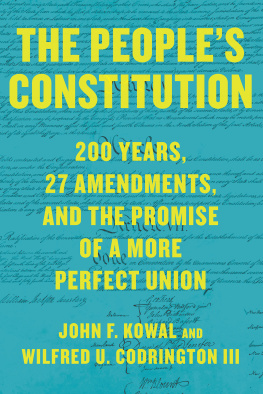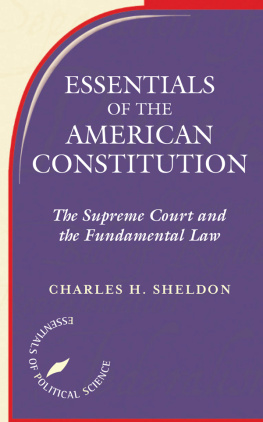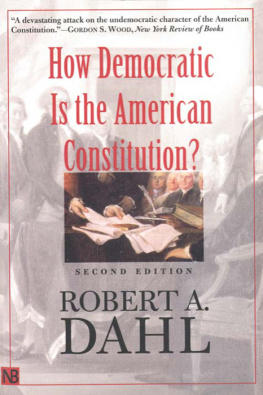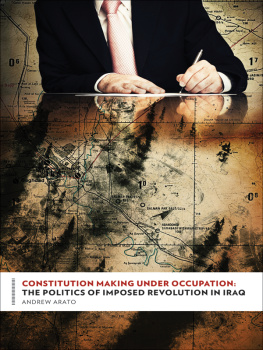USA - Plain, honest men: the making of the American Constitution
Here you can read online USA - Plain, honest men: the making of the American Constitution full text of the book (entire story) in english for free. Download pdf and epub, get meaning, cover and reviews about this ebook. City: New York;NY;Verfassung, year: 2010;2009, publisher: Random House Publishing Group, genre: History. Description of the work, (preface) as well as reviews are available. Best literature library LitArk.com created for fans of good reading and offers a wide selection of genres:
Romance novel
Science fiction
Adventure
Detective
Science
History
Home and family
Prose
Art
Politics
Computer
Non-fiction
Religion
Business
Children
Humor
Choose a favorite category and find really read worthwhile books. Enjoy immersion in the world of imagination, feel the emotions of the characters or learn something new for yourself, make an fascinating discovery.

- Book:Plain, honest men: the making of the American Constitution
- Author:
- Publisher:Random House Publishing Group
- Genre:
- Year:2010;2009
- City:New York;NY;Verfassung
- Rating:4 / 5
- Favourites:Add to favourites
- Your mark:
- 80
- 1
- 2
- 3
- 4
- 5
Plain, honest men: the making of the American Constitution: summary, description and annotation
We offer to read an annotation, description, summary or preface (depends on what the author of the book "Plain, honest men: the making of the American Constitution" wrote himself). If you haven't found the necessary information about the book — write in the comments, we will try to find it.
USA: author's other books
Who wrote Plain, honest men: the making of the American Constitution? Find out the surname, the name of the author of the book and a list of all author's works by series.
Plain, honest men: the making of the American Constitution — read online for free the complete book (whole text) full work
Below is the text of the book, divided by pages. System saving the place of the last page read, allows you to conveniently read the book "Plain, honest men: the making of the American Constitution" online for free, without having to search again every time where you left off. Put a bookmark, and you can go to the page where you finished reading at any time.
Font size:
Interval:
Bookmark:
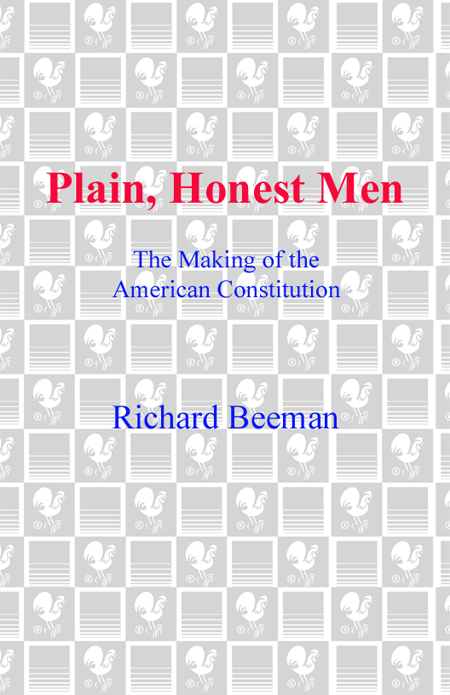
ALSO BY RICHARD BEEMAN
The Varieties of Political Experience in Eighteenth-Century America
Beyond Confederation:
Origins of the Constitution and American National Identity (ed.)
The Evolution of the Southern Backcountry: A Case Study of Lunenburg
County, Virginia, 1746-1832
Patrick Henry: A Biography
The Old Dominion and the New Nation, 1788-1801
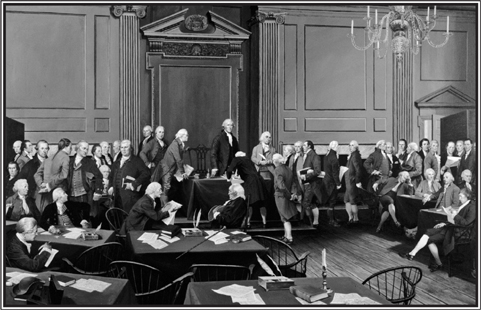
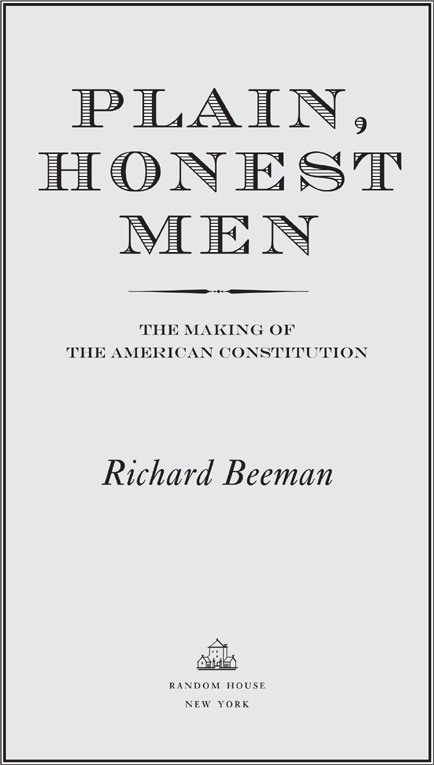
To Mary
ON SEPTEMBER 18, 1787, the day following adjournment of the Constitutional Convention, an exhausted George Washington dashed off a quick note to the Marquis de Lafayette. He had promised his old comrade in arms a full account of the proceedings of the Convention, but, desperately eager to return to Mount Vernon, he could summon up only enough energy to offer a brief characterization of that summer's work. The production of four months deliberation, Washington wrote, was now a Child of fortune, to be fostered by some and buffeted by others. What will be the General opinion on, or the reception of it, is not for me to decide, nor shall I say any thing for or against itif it be good, I suppose it will work its way goodif bad it will recoil on the Framers.
Nearly five months later, comfortably ensconced at Mount Vernon and warmed by a fire on a bitterly cold February day, the general's optimism about the proposed new Constitution had improved considerably. Writing again to Lafayette, Washington observed that it was little short of a miracle that the men gathered in Philadelphia that past summer could unite in forming a system of government so little liable to well-founded objections.
Catherine Drinker Bowen began her stirring 1966 account of the making of the Constitution, Miracle at Philadelphia, with an evocation of Washington's more sanguine assessment of the Constitution. Miracles,
Gouverneur Morris, a Convention delegate from Pennsylvania who shared Washington's hopes for the proposed Constitution, had achieved his fame and fortune by keeping his eyes fixed on worldly concerns, not on the heavens. Speaking of the document that emerged from the Assembly Room of the Pennsylvania State House, Morris noted that while some have boasted it as a work from Heaven, others have given it a less righteous origin. I have many reasons to believe that it is the work of plain, honest men.
Morris's homely description, though perhaps less inspiring than Washington's or Bowen's, brings us closer to the truth. But it takes us only a part of the way toward understanding either the individuals or the set of circumstances that brought the American Constitution into being. The Constitutional Convention of 1787 effected a revolution in the nature of the American government. That revolution occurred neither by accident nor by divine intervention. It was, in its inception, the work of a small group of men who had become convinced that America's experiment in republican liberty was in jeopardy and that bold action was necessary if that experiment was to flourish. Those menmost conspicuous among them Washington, James Madison of Virginia, and two Pennsylvania delegatesGouverneur Morris and James Wilsonset the revolution in motion by introducing during the early days of the Convention a bold, even audacious, plan for an entirely new form of national government. But their attempt at revolutionary change, once launched, proved difficult both to sustain and to control.
This book presents a full narrative account of the work of the fifty-five men who spent the summer of 1787 in the Assembly Room of the Pennsylvania State House crafting an entirely new form of continental government. Much of their work occurred during the formal sessions of the Convention itself, running six days a weekwith only Sundays off between May 25 and September 17. But I intend also to take readers behind the scenes and beyond the debates, into the taverns and boardinghouses of the city, to present a full account of how the world's most important constitution was forged.
An important part of the story hinges on the individual and collective characters of the men responsible for the Constitution's drafting. Interspersed
As the historian Gordon Wood has reminded us, the leaders of America's Revolutionary generation were not men of the twenty-first century. They were the product of a particular place and moment of the late eighteenth century. They were deliberating at a point in history when intellectualism and political activism could naturally, easily, coexist. The most influential of these men could lay claim to being both the intellectual and political leaders of their respective statesmen confident of their ability to put their ideas about politics into practical form.
For all of their ability to combine intellect and activism, however, the Founding Fathers were also products of a provincial worldone in which the perspective of even the most cosmopolitan among them was limited by the vast expanse of the American landscape and the inadequacies of the communication networks available to them in eighteenth-century America. Whether residents of Georgia or Maryland, New York or New Hampshire, the delegates of the 1787 Constitutional Convention struggled against the limitations they faced not only to envision themselves as citizens of a single nation but to forge a coalition of their individual states into a unified whole.
When viewed through the lens of the twenty-first century, the creation of a durable, democratic nation among thirteen disparate and far-flung sovereign states assumes an aura of inevitability. But when viewed from the perspective of the summer of 1787, that outcome was more improbable than inevitable. It is my hope that the readers of Plain, Honest Men: The Making of the American Constitution will come to appreciate not only the extraordinary achievements of the Founding Fathers, but also the conflict, contingency, and uncertainty that marked their deliberations.
While most of the delegates came to Philadelphia hoping to create a significantly strengthened continental government, none of them could have imagined the goliath of a nation that America was to become. And few of them could have imagined that this goliath would become a democratic nation. The vast majority of the Founding Fathers were republicans, not democrats, which is to say that they had rejected monarchy and hereditary rule and they had embraced unequivocally the idea of representative government. But there were nearly as many different answers to the question of how to define the relationship between representatives and the citizens they served as there were delegates to the Convention. At one extreme, there were those who believed that representatives had an obligation to mirror faithfully the views of their constituents. At the other, many of the Convention delegates believed that the best form of representative government was one in which the virtuous few, once elected or appointed to office, acted independently of the whims of public opinion to serve the public good.
Just as the delegates regarded democracy with varying degrees of enthusiasm, so too did they differ in their understanding of the meaning and character of the very structures of government they were creating. As the delegates began their deliberations in late May, they most often spoke of creating a national government. As they ended their deliberations in mid-September they tended to describe their creation as federal. Within a few months of their adjournment, James Madison was speaking of the proposed new government as part national and part federal, but there was precious little agreement among even those who had drafted the Constitution as to the precise meaning of this new definition of federalism.
Font size:
Interval:
Bookmark:
Similar books «Plain, honest men: the making of the American Constitution»
Look at similar books to Plain, honest men: the making of the American Constitution. We have selected literature similar in name and meaning in the hope of providing readers with more options to find new, interesting, not yet read works.
Discussion, reviews of the book Plain, honest men: the making of the American Constitution and just readers' own opinions. Leave your comments, write what you think about the work, its meaning or the main characters. Specify what exactly you liked and what you didn't like, and why you think so.


